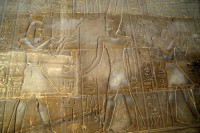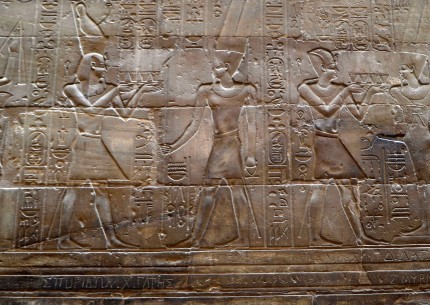 Two years ago, a Chinese teenager visiting Egypt with his parents etched his name on a sandstone relief of Alexander the Great in the temple of Amenhotep III in Luxor. On May 24th, Shen, a Chinese tourist visiting the temple posted a picture of the “Ding Jinhao was here” graffito defacing Alexander’s chest and lap to the microblogging site Weibo describing it as “the saddest moment in Egypt. I’m so embarrassed that I want to hide myself. I said to the Egyptian tour guide, ‘I’m really sorry.’ I tried to erase this shame by rubbing it off, but my effort was in vain.”
Two years ago, a Chinese teenager visiting Egypt with his parents etched his name on a sandstone relief of Alexander the Great in the temple of Amenhotep III in Luxor. On May 24th, Shen, a Chinese tourist visiting the temple posted a picture of the “Ding Jinhao was here” graffito defacing Alexander’s chest and lap to the microblogging site Weibo describing it as “the saddest moment in Egypt. I’m so embarrassed that I want to hide myself. I said to the Egyptian tour guide, ‘I’m really sorry.’ I tried to erase this shame by rubbing it off, but my effort was in vain.”
The post went viral immediately. Within 12 hours, the picture had been re-tweeted (re-Weiboed?) more than 90,000 times and engendered universal condemnation on and offline. People tracked the vandal down using what is both creepily and awesomely called “a human flesh search” (doxing sounds so innocuous by comparison) and discovered he’s a 15-year-old boy in Nanjing, Jiangsu Province, East China. His school’s website was hacked and abusive messages left excoriating him for being an awful 13-year-old tourist (recalling my own youth, that phrase might be redundant).
Things got so heated Ding’s parents spoke to the Nanjing Modern Express taking the blame for their failures as parents and asking for forgiveness. Ding’s mother apologized to the Egyptian people and to all the people in China who were upset by her son’s actions. Ding is older and wiser, according to mom, and now recognizes that what he did was wrong.
Ding’s parents told the Modern Express that it was their lack of education and supervision that led to his mischief.
They said the attack happened when their son, now in middle school, was little. They were with a tourist group and did not notice when he scrawled on the sculpture, the mother said.
“We have taken him sightseeing since he was little, and we often saw such graffiti. But we didn’t realise we should have told him that this is wrong,” she said. The mother also implored internet users not to hound her son.
This is a hot topic because as of 2012, Chinese tourists officially outpaced Americans and Germans as the world’s top spenders on international tourism. In 2012, 83 million Chinese nationals spent $102 billion on travel outside China. Just two weeks ago Chinese Vice Premier Wang Yang appealed to his countrymen to be polite when traveling abroad so as to not besmirch China’s reputation with their “uncivilized behavior.”
“They make a racket in public places, carve words at scenic spots, cross the road when the light is red, spit, and do other uncivilized things,” Wang was quoted as saying. “This is detrimental to the image of the country’s people and leaves a bad impression.”
So did the plaid polyester slacks and questionable headgear that marked American tourists in my day.
Anyway, the end result of all this brouhaha was that Egyptian antiquities ministry looked into the graffito and were able to remove it with relative ease. The etched lines were only superficial, which isn’t surprising given that they were scratched by a 13-year-old, and the main layer of the engraving was unscathed. The relief is now back to its former faded splendor. You wouldn’t know Ding Jinhao was ever there.

In no way condoning this sort of vandalism, but Egyptian sites have a lot of historic graffiti. I remember seeing the names & dates from soldiers in Napoleon’s army in one temple (which was kind of cool). And in the photographs, isn’t that ancient graffiti in perhaps Greek running along the stone below the figures?
Lord Byron scratched his name on the temple at Sounion, along with a lot of other tourists.
Sorry, that last comment about Lord Byron was me.
This kind of vandalism occurs at many petroglyph sites in North America as well. I doubt there are many Egyptians today that consider these places holy, but we natives do our places. Says a lot about the values of a person who would do something like that.
pulltabMiner was here!!
I sorrowfully apologize for leaving the above graffiti in your blog.
He he he…seriously, somebody retro-cane that miscreant for defacing that piece of what-ever-it-was-that-I-will-probably-never-see.